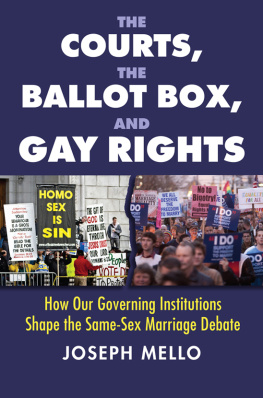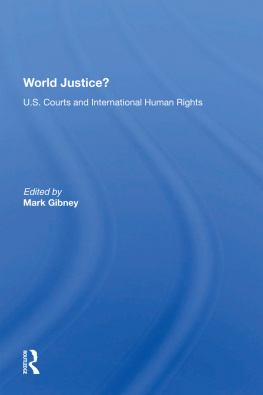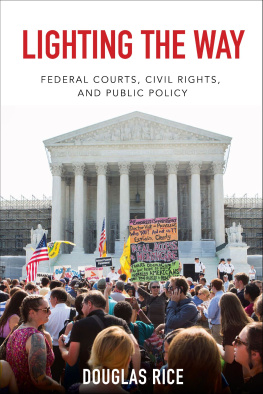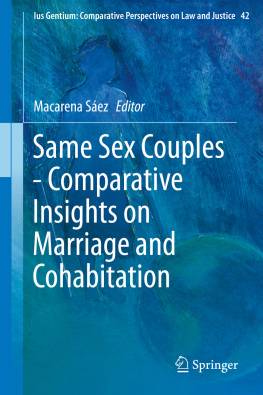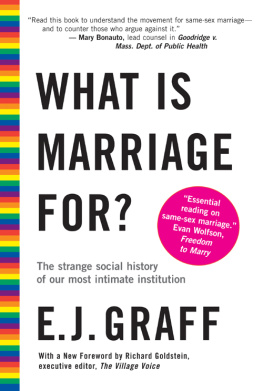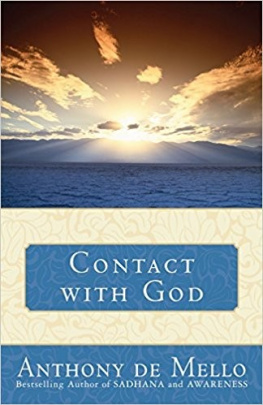The Courts, the Ballot Box,
& Gay Rights
The Courts, the Ballot Box,
& Gay Rights
HOW OUR GOVERNING INSTITUTIONS SHAPE THE SAME-SEX MARRIAGE DEBATE
Joseph Mello
2016 by the University Press of Kansas
All rights reserved
Published by the University Press of Kansas (Lawrence, Kansas 66045 ), which was organized by the Kansas Board of Regents and is operated and funded by Emporia State University, Fort Hays State University, Kansas State University, Pittsburg State University, the University of Kansas, and Wichita State University
Library of Congress Cataloging-in-Publication Data
Names: Mello, Joseph, author.
Title: The courts, the ballot box, and gay rights : how our governing institutions shape the same-sex marriage debate / Joseph Mello.
Description: Lawrence, Kansas : University Press of Kansas, 2016 . | Includes bibliographical references and index.
Identifiers: LCCN 2016014265 | ISBN 9780700622917 (cloth : alk. paper) | ISBN 9780700622924 (ebook)
Subjects: LCSH: Same-sex marriageLaw and legislationUnited States.
Classification: LCC KF .M 45 2016 | DDC . 7301 /dc
LC record available at http://lccn.loc.gov/2016014265.
British Library Cataloguing-in-Publication Data is available.
Printed in the United States of America
10 9 8 7 6 5 4 3 2 1
The paper used in this publication is recycled and contains percent postconsumer waste. It is acid free and meets the minimum requirements of the American National Standard for Permanence of Paper for Printed Library Materials Z.- 1992 .
Contents
Acknowledgments
This book would not have been possible without the help of many people. I benefited immensely from the insights of Jeff Dudas, David Yalof, Kristen Kelly, Virginia Hettinger, and the late Howard Reiter during the earliest stages of developing this project. I am particularly thankful to Jeff for introducing me to the field of law and society and for helping me craft a bunch of jumbled ideas into a coherent narrative. Jeff has also been a great mentor and general sounding board for me over the years. I could not have done this without him. I would also like to thank the various discussants, conference participants, journal editors, and workshop coordinators who read portions of this project over the years and provided useful commentaryin particular Anna-Maria Marshall, for her feedback on the California case study at the Law and Society Associations Early Career Workshop, and Joshua Wilson, for his insights on the Maine case study. Also thanks of course to Chuck Myers and his editorial staff at the University Press of Kansas for believing in this project and for helping to steer it to completion.
I have had so many great colleagues and mentors who have provided me support while working on this project. I would like to thank my colleagues at DePaul for creating a wonderful and engaging environment to work in every day, and Wayne Steger in particular for being a great mentor to me during the first few years of my career. Also thanks to Renee Cramer for giving me my first real academic job at Drake University and for being such a great source of support and advice. I developed many of the ideas for this project while in graduate school at the University of Connecticut. I would like to thank all of the people who helped make that experience more enjoyable. Special thanks to the contingent of law and society scholars in my cohort, including Sarah Hampson, Jamie Huff, Allyson Yankle, Dan Tagliarina, and Corinne Tagliarina. I am sure that many of the insights they shared with me during class, or over beers, have made their way into this book in one way or another. Also, thanks to Jason Charrette for helping code the dataset used in of this book. Finally, I have to thank Richard Ellis at Willamette University for encouraging me to go to graduate school in the first place. Richard saw potential in a young scholar who was, in his words, a total slacker. He also saved me from becoming a lawyer by pulling me into his office during my senior year at Willamette and encouraging me to get a PhD instead. Richard continues to be a great source of advice and encouragement. His career is an inspiration to me as wellif I can be half as prolific a scholar as he has been, I will feel like I am doing pretty well for myself.
Last, but certainly not least, I must thank my family for supporting me as I worked through this project. My wife, Brianna Mello, is probably the only person other than me who has read every word of this book. Bri is an extremely talented copy editor, and this books arguments are presented much more clearly and succinctly thanks to her efforts. Perhaps most importantly, though, she provided me the emotional (and financial) support I needed to get through the difficult times during graduate school. I do not know how I would have been able to cope with the crippling amount of uncertainty and anxiety that all academics must face during the first few years of their career without her. I would also like to thank my parents, Frank and Jeannie Mello, for always encouraging me to pursue my education and for enthusiastically supporting my decision to go to graduate school, even after I told them how long it would take to get my PhD and how little money political scientists actually make. Finally, I would like to thank my children, Elizabeth and Everett, for providing a needed distraction from the occasional drudgery of academic work, and Brent and Karen White for occasionally relieving me from watching them so that I could finish writing this book.
. The Mobilization of Bias
The majority today... seizes for itself a question the Constitution leaves to the people, at a time when the people are engaged in a vibrant debate on that question.... I have no choice but to dissent.... This dissent... is not about whether, in my judgment, the institution of marriage should be changed to include same-sex couples. It is instead about whether, in our democratic republic, that decision should rest with the people... or with five lawyers who happen to hold commissions authorizing them to resolve legal disputes according to law. The Constitution leaves no doubt about the answer.
CHIEF JUSTICE JOHN ROBERTS
(Dissenting opinion, Obergefell v. Hodges 2015 )
The idea of the Constitution was to withdraw certain subjects from the vicissitudes of political controversy, to place them beyond the reach of majorities and officials and to establish them as legal principles to be applied by the courts.... This is why fundamental rights may not be submitted to a vote; they depend on the outcome of no elections.
JUSTICE ANTHONY KENNEDY
(Obergefell v. Hodges 2015 )
The US Supreme Courts landmark decision in Obergefell v. Hodges ( 2015 ) effectively ended an intense nationwide debate over the proper definition of marriage by legalizing same-sex marriage in all fifty states. Although much of this nearly two-decades-long debate was spent weighing the substantive implications of continuing to define marriage as a union of one man and one woman, the case itself touched not just on the question of what the definition of marriage should be but also on who should be charged with determining that definitionthe courts or the people. The question of who should decide issues of fundamental rights has been a recurring point of reflection for the Supreme Court justices of late. In 2014 they issued an emphatic defense of Michigans right to determine affirmative action policy through the ballot measure process (

